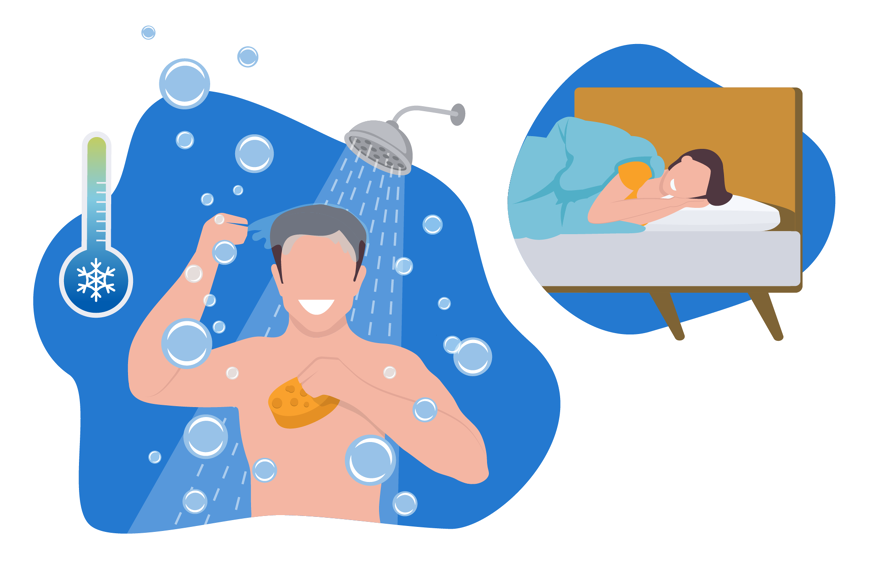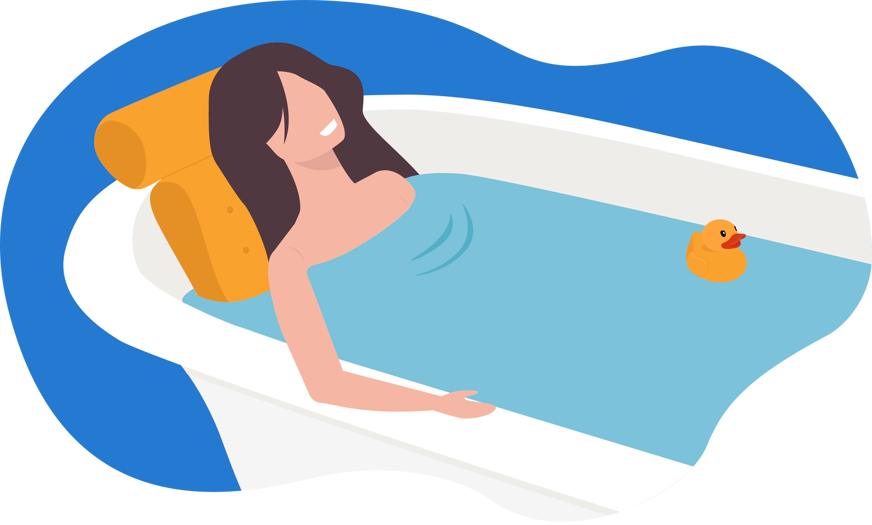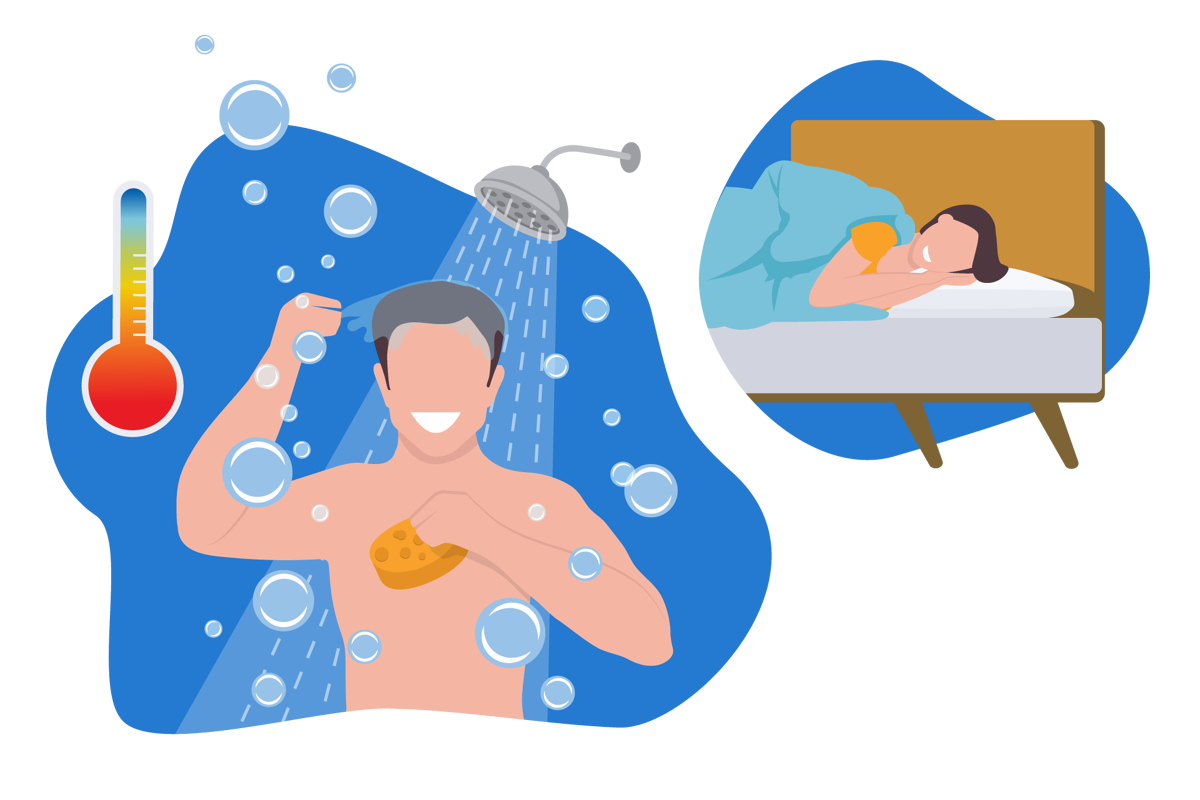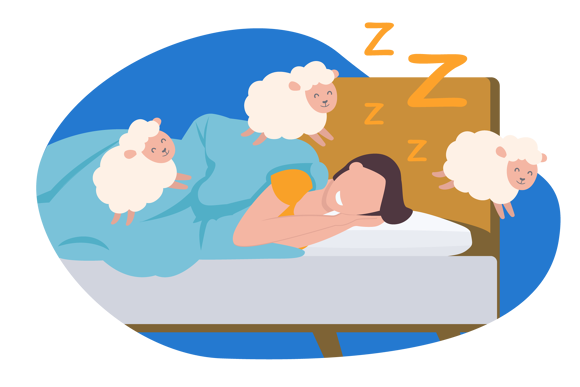Understanding the science behind showering before bed
Understanding the science behind showering before bed reveals fascinating insights into how this simple bedtime routine can significantly enhance sleep quality, primarily through its effects on body temperature regulation [1].
Does a hot shower help you sleep better?
Core body temperature is closely tied to our sleep-wake cycle, and a drop in body temperature signals the brain that it’s time to sleep.
Taking a warm shower 1 - 2 hours before bedtime can artificially raise the body’s temperature.
Once out of the shower, the rapid cool-down period that follows helps to mimic the natural drop in body temperature and increases melatonin production, making it easier to fall asleep.
Does a cold shower help you sleep better?
Taking a cold shower before bed can also improve sleep, especially in warmer climates or during hot weather.
Cool water can help lower your body’s core temperature, which is conducive to initiating sleep.

Additionally, the cold can be invigorating, reducing stress and calming the body, making it easier to fall asleep.
Further down, we look at some temperature considerations that will help you choose between a hot and a cold shower.
Health and wellness benefits of showering before bed
While a hot shower is most beneficial for helping you sleep better [2], both hot and cold showers have a number of health and wellness benefits.
Health benefits of a hot shower before bed
Let’s first look at some of the health benefits of having a hot or warm shower before going to bed.
Improved sleep quality
The warmth from a hot shower can increase your body temperature.
Following the shower, your body cools down, which mimics the natural decrease in body temperature that signals it’s time to sleep, helping you fall asleep faster and more deeply. 😴
Muscle relaxation
The hot water helps to relax muscles and relieve tension, reducing pain and discomfort from physical activities or stress and making it easier to achieve restful sleep.
Stress reduction
The soothing effect of a hot shower can decrease blood pressure and lower stress and anxiety levels by calming the nervous system, creating a sense of relaxation and tranquility that prepares the mind for sleep.

Skin cleansing
Hot showers can help open pores and cleanse the skin, removing toxins and dirt accumulated throughout the day, which might contribute to better skin health.
Improved circulation
The heat from the shower can improve blood circulation, aiding in the body’s recovery and relaxation processes.
Sinus relief
The steam from a hot shower can help clear nasal passages, offering relief from symptoms of allergies or colds.
This makes it easier to breathe and, thus, sleep better.
Health benefits of a cold shower before bed
Although cold showers may not have the same sleep-inducing benefits as warm showers, they can still offer a host of health and well-being benefits [3].
Cooling down
A cold shower can lower your body’s core temperature, which is particularly beneficial during warm weather or in warmer climates.
This makes it easier to fall asleep in hot conditions.
Stress reduction
Exposure to cold water can increase endorphin levels, the body’s natural pain and stress fighters.
This can reduce stress and lead to a feeling of well-being.
Improved circulation
Cold showers can also improve circulation by encouraging blood to surround your organs, which can help combat problems related to the heart and skin.
Enhanced alertness
Though it might seem counterintuitive for sleep, the initial shock, heightened cortisol production, and subsequent increase in heart rate from a cold shower can increase alertness, which, when timed well before bed, can lead to more profound relaxation.
Skin and hair health
Cold water can help to tighten cuticles and pores, which prevent them from getting clogged.

It can also seal in moisture in the skin and scalp, potentially improving the condition of both.
Immunity boost
Regular cold showers can increase the number of white blood cells in your body, which may boost the immune system, helping to fight off illnesses. 💉
Practical considerations for the UK climate
When incorporating showering before bed into your routine, especially within the UK’s varied climate, there are a few practical considerations to keep in mind.

The UK experiences a wide range of temperatures throughout the year, from cold, damp winters to occasionally warm summers.
These fluctuations can influence the most beneficial water temperature for showering and the approach to staying warm afterwards.
Here are the best water temperatures for different seasons:
- In the cooler months, a warmer evening shower or hot bath can help raise your body temperature, making it easier to feel cosy and ready for bed. However, it’s essential not to make the water too hot, as this can lead to dry skin and irritations. A moderately warm shower is sufficient to benefit from the temperature drop post-shower, which aids sleep initiation.
- During the warmer summer months, a slightly cooler shower might be preferable. This can help lower your body temperature on hot nights, making it easier to fall asleep despite the heat.
After taking a shower, it’s important to avoid an uncomfortable chill, particularly in the winter months.
Ensuring your heating system is adequately set to maintain a comfortable temperature is worth gold, but if you’re saving on heating costs, you could also consider something snuggly, like a blanket hoodie or Oodie to keep you warm.
Enhancing your nighttime shower routine
To enhance your nighttime shower routine for optimal relaxation and sleep readiness, consider incorporating elements that engage all your senses and promote tranquillity.
- Begin by setting a warm, comfortable water temperature to help relax your muscles and prepare your body for sleep.
- Use gentle, natural, and possibly aromatherapeutic shower products with scents like lavender or chamomile, which are known for their calming properties.
- Dim the bathroom lights or use candles to create a soothing ambience, and consider playing soft music or nature sounds to further calm the mind.
- After showering, wrap yourself in a plush, warm towel or robe, and apply a moisturiser to hydrate your skin, choosing one with a soothing scent to reinforce the sense of relaxation.
By creating a serene environment and using products that soothe the senses, you can transform your nighttime shower into a ritual that significantly enhances a good night’s sleep.

Should you shower before bed?
Showering before bed not only ensures you climb into your sheets squeaky clean, but it also has multiple stress-reducing and sleep-inducing properties.
Adding a warm nighttime shower can be a key step in establishing a healthy sleep routine, so why not give it a try?
















Alternatively, message us directly via the Contact Us page.